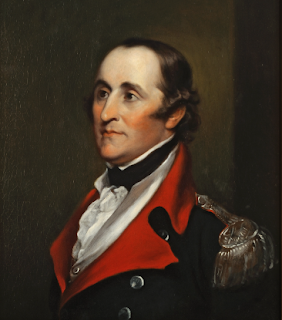Peyton Randolph ought to be remembered. He was the very first President of the very first Continental Congress. He also signed the Continental Association, a trade boycott in response to the Intolerable Acts that were instituted to punish the colonists after the Boston Tea Party. Peyton was seen by the British as ringmaster amongst instigators…
 |
| Peyton Randolph |
He was accorded the reception of any troublesome colonist amongst the court of St. James… which is to say, none whatsoever. To make matters worse, Peyton Randolph was also seen as the titular head of the troublesome colonists, and in May of 1775, when the 2nd Continental Congress began, it was once again, Peyton Randolph who was elected President. During his time as President, Peyton Randolph fell ill and stepped down to recover. It was John Hancock who replaced him as President when Congress put quill to paper and signed the Declaration of Independence.
Each person who signed understood, in no uncertain terms, they were essentially signing their own death warrant. Of course, this could apply to their families also. Given the dim prospect of defeating the World’s greatest military force with a group of different militias, and with limited capacity to produce war materials and vulnerable to naval blockade… they signed. Such was their passion for the idea of a truly representative government.
The declaration was also designed to demonstrate, in the most practicable way, the very depth of American dedication and commitment to the cause. Such commitment greatly amplified support in the Court of Versailles and was well received by King Louis XVI.
,_rev%C3%AAtu_du_grand_costume_royal_en_1779_-_Google_Art_Project.jpg) |
| King Louis XVI |
Smuggling routes that ran from Europe to the West Indies, and then into the southern ports where the Spanish looked the other way had kept the American Revolution afloat. When the Treaty of Aranjuez was signed on 12 April 1779, it called for French support to assist Spain in recovering its former possessions of Menorca, Gibraltar, and Spanish Florida (East and West Florida). In exchange, Spain would support the revolution.
In October 1781, the French naval blockade was instrumental in forcing a British army under Cornwallis to surrender at the Siege of Yorktown. When news of this reached London in March 1782, the government of Lord North fell and Great Britain immediately sued for peace terms. France delayed the end of the war until September 1783 in the hope of overrunning more British colonies in India and the West Indies.
Nevertheless, when the Marquess of Rockingham was appointed Prime Minister, he immediately pushed for an acknowledgment of the independence of the United States, initiating an end to British involvement.
What price was paid by the signors of the Declaration of Independence?
1) Five signers were captured by the British as traitors, and tortured before they died.
2) Twelve had their homes ransacked and burned.
3) Two lost their sons in the revolutionary army.
4) Another had two sons captured.
5) Nine of the 56 fought and died from wounds or hardships of the revolutionary war.
 |
| Samuel Huntington |
When John Jay left the Second Continental Congress to become Minister to Spain, my 3rd Cousin 7x, Samuel Huntington, was elected to succeed him as President of the Continental Congress. He signed the Declaration of Independence and the Articles of Confederation. His autograph was small but neat and precise. You can find his signature on the right side underneath Roger Sherman. On the same line higher up were John Adams and Samuel Adams.
Huntington was President of the Continental Congress when the last state ratified the Articles of Confederation (Maryland) on March 01, 1781. Thus, our first form of government was born. Upon ratification by Maryland, the transition was uninterrupted, and Huntington immediately became the first President under the Articles of Confederation. He resigned shortly thereafter having assured the new country was properly born of the Articles of Confederation. He returned to Connecticut to convalesce. Between 1784 and 1796, he served as Lieutenant Governor, Chief Justice of the Connecticut Supreme Court, and, eventually, the state's Governor. During his time, he oversaw the transition of Connecticut into statehood, the adoption of the Federal Constitution, and the beginnings of the building of a State House in the newly made capitol, Hartford.
 |
| Surrender of Cornwallis at Yorktown |
Ebenezer initially joined the 2nd Connecticut Regiment and rose to Lt. Col. in the Continental Army serving with General Washington. He later became a Brigadier General in the US Army. On the Groat side, my 5th Great Uncle, Peter Groat, served with the New York 8th Albany Regiment, and his brother John served with the 3rd Albany Regiment. Six other family members are also on the rolls of the Albany Regiments.

No comments:
Post a Comment